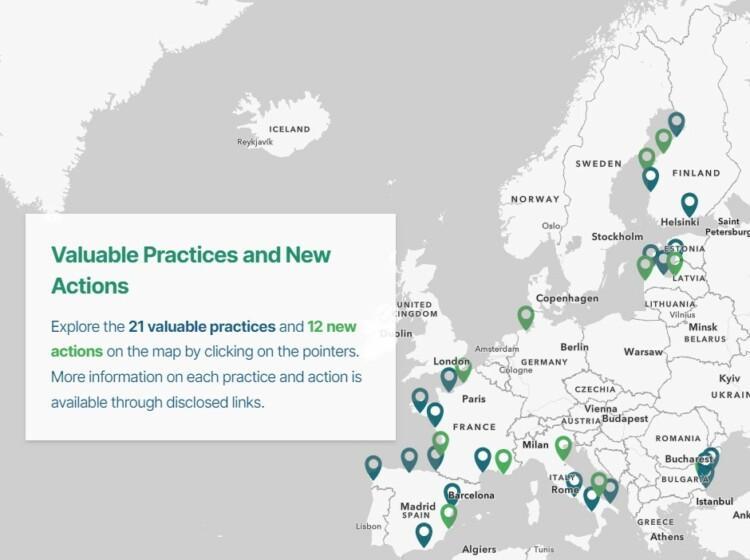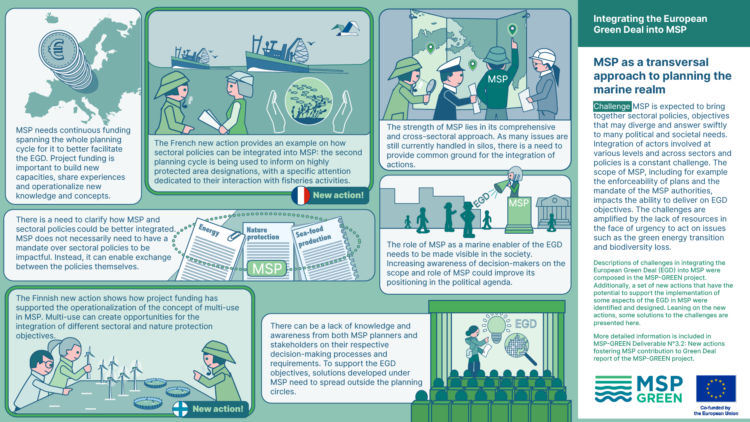Lessons learned from valuable practices and new actions will guide MSP towards a green transition
The objectives set in the European Green Deal are leading maritime spatial planning (MSP) towards new challenges. Supporting the green transition is one of the cross-cutting themes of the second MSP cycle in Finland, thus affecting the whole plan and the marine sectors and environment it addresses. Good practices and tools to address the challenges were drawn from valuable practices and solution-oriented new actions from seven EU countries.
Supporting the objectives of the European Green Deal in the context of MSP requires concrete actions as part of the second planning cycle. New ideas supporting the work have been generated through sharing good and bad experiences as part of the EU-wide MSP-GREEN 2022-2024 project. The work done in Bulgaria, Finland, France, Germany, Italy, Latvia, and Spain resulted in a knowledge base from which lessons have been drawn with the aim to apply them in the Finnish context. A wide range of valuable practices and new actions address the Green Deal objectives from multiple perspectives: from climate change mitigation and adaptation to a fair and just green transition.
Find out more about the valuable practices and new actions in the StoryMap. You can find all the documents related to the work at the end of this article.
Valuable practices in Finnish marine spatial planning
While the European Green Deal sets a new framework for considering the sustainable future of marine areas many of its principles are familiar to MSP. Several of the Green Deal themes have already been highlighted in the Maritime Spatial Plan for Finland 2030. Lessons have been drawn from the actions and studies carried out during the first planning rounds of the participating countries. Three valuable practices from Finland were highlighted. The scenarios for the future of the maritime area show how forward-looking and stakeholder-driven approaches both enhance the ability of planning to anticipate the future and strengthen the effectiveness of the plan. The identification of significant underwater natural values areas and areas with potential for offshore wind energy production are both valuable practices that highlight ways to directly support Green Deal objectives related to among other themes biodiversity and ecosystem protection and climate change mitigation. Work on both these themes and further improvement of the approaches is continued as part of the second planning round.
New actions supporting MariParks and fisheries and climate change considerations in MSP
Marine multi-use is one of the cross-cutting themes of the second MSP round and work around the topic has been done in numerous stakeholder meetings. The first new actions are part of this continuum. The aim was to define how MariParks and multi-use of areas could be approached in MSP and in which ways the topic could be approached in the updated Maritime Spatial Plan. You can read more about the earlier work here: Baltic Sea and North Sea cooperation takes a leap towards sustainable use of the seas – marine multi-use areas support nature and sectors“.
The second new action looked at the impact of climate change on fisheries. The aim was to increase sectoral understanding on the impacts of climate change, with an additional objective of gaining understanding of the opportunities and possibilities related to climate-smart MSP. The work was carried out as part of a wider exercise which focused on how MSP could better support the sustainable development of the fishing sector. You can read more about the work here: “Taking fisheries into account in maritime spatial planning – report now available“.
There are several challenges related to the promotion of the objectives of the European Green Deal in MSP. Leaning on the new actions, some solutions to the challenges are presented in the infographics. Click on the image above to view all six infographics.
The reports, together with the descriptions of Finland’s valuable practices and new actions, are available on the project’s website:
D3.1 Sharing valuable practices for boosting the Green Deal through MSP
- Ecologically significant marine underwater areas (EMMA) in Finland
- Offshore wind farm location optimisation
- Co-creation of scenarios for the future of maritime areas
D3.2 New actions fostering MSP contribution to Green Deal
- Adaptation of the fisheries sector to climate change in MSP
- Multi-use of marine areas in Finnish MSP
This work has been carried out as part of the MSP-GREEN project, funded by the European Maritime, Fisheries and Aquaculture Fund. The project period is November 2022 – October 2024.
Project website: https://mspgreen.eu/
Twitter: @MSPGREEN22 & LinkedIn: MSP – GREEN



